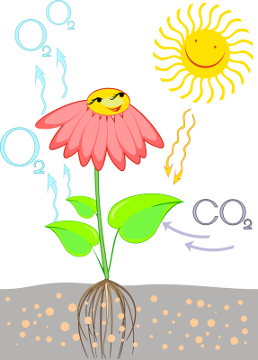Most living beings, like us, need food to survive, don't they? Every day we need to eat a few meals in order to get energy to do our daily activities. When that doesn't happen, we become weak, unwilling and sometimes even faint. Some beings, however, do not need to feed on other living beings, as they are able to produce their own food in their bodies.
plants, algae and some bacteria are examples of organisms that have the incredible ability to produce organic substances in your own body, not needing to ingest them. Living beings that have this ability are called autotrophic organisms.
Some autotrophic organisms produce organic substances from inorganic substances in a process called photosynthesis. This process, very briefly, can be defined as the phenomenon in which some living beings use water and carbon dioxide to produce oxygen and glucose in the presence of light. (To learn more about this process, Click here!)

Plants carry out photosynthesis, so they are autotrophic organisms
Autotrophic organisms form the basis of a
food chain and they serve as food for a multitude of other living beings who are incapable of producing their food. All organisms that must ingest organic molecules from another living being are called heterotrophic.All theanimals, protozoa, fungiand somebacteriathey are heterotrophic beings. These organisms are not able to carry out photosynthesis and, therefore, must feed on other beings. Although fungi are similar to plants, they do not carry out photosynthesis and take their food from the organic matter present in the environment in which they live.
In a food chain, the autotrophic organisms are usually called producers. already the heterotrophic organisms can play the role of consumers or decomposers.
In short:
Autotrophic:Organism capable of producing its own food. Example: plants, algae and some bacteria.
Heterotrophic:Organism incapable of producing its food, needing another living being for its nutrition. Example: animals, fungi, protozoa and some bacteria.
Take the opportunity to check out our video classes on the subject:


